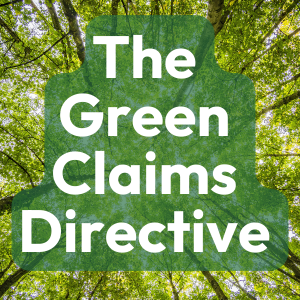On 19th September 2023, the European Parliament and Council reached a provisional agreement on new rules governing environmental claims following a Directive that aims to prevent companies making unsubstantiated environmental claims, something that has been referred to in the media as “greenwashing”.
The Green Claims Directive aims to:
- Improve the reliability of information provided to consumers and facilitate the choice of products offering better environmental performance.
- Ensure environmental claims may only be made if they meet certain minimum criteria and are independently verified by a third-party assessment body.
- Enforce the Directive by giving rise to damage claims before civil courts where misleading environmental information has been provided.
At Cemex, we’ve made significant improvements in reducing carbon emissions from our Cement making process through lowering the levels of clinker used and through pioneering the use of alternative fuels at our Rugby Cement plant. We’re also expanding the number of products within our Vertua® range that offer lower carbon solutions to the industry.
However, we still need to ensure that when we talk about these improvements and promote our products, whether this is when speaking to customers, creating presentations or leading training, for example, we do so in a way that complies with the Green Claims Directive and to ensure that we are not in any way misleading the consumer.
One of the ways that we can all help to do this is to ensure that we are using the phrases, “lower carbon” and “more sustainable” when describing our operations, cement making process, products and solutions. These terms most accurately describe the improvements that we have made, and we can verify these to be true.
The below table provides a guide to how we should be describing the improvements we have made, phrases to avoid using and the rationale behind this.
| Don’t say… | Do say... |
|---|---|
| Low carbon We’ve come a long way towards lowering our carbon emissions through the use of alternative fuels and by reducing the amount of clinker used in the cement making process however, we cannot yet say that our operations, cement making or products are low carbon. | Lower carbon We certainly can say that we produce some lower carbon products, particularly those that are part of our Vertua range and we are able to verify a reduction in the amount of carbon produced as part of this process. |
| Sustainable If the production of a product requires non-renewable resources or produces some level of carbon emissions, it cannot be considered fully sustainable. Whilst we’ve made considerable progress and continue to accelerate this progress, we’re not at a stage where we can talk about our operations as being fully sustainable and it would therefore be misleading to suggest this. | More sustainable What we can say and back-up with facts and data is that our operations and cement making as well as the manufacture of some of our products are now more sustainable through the fact that we emit less carbon into the atmosphere than previously, and this is something that we will continue to progress to create a more sustainable business and move towards our aims of becoming a net zero carbon business by 2050. |
| Carbon neutral We’re making huge strides to decarbonise our operations and our cement making to create more sustainable products. Whilst we’re on a journey to continue to reduce or lower the amount of carbon produced during manufacture, we are not at a point where we could make the claim of being a carbon neutral business. | More sustainable / lower carbon We are decarbonising our operations and cement making to create lower carbon products through our Vertua range with an ambition to become a net zero carbon business globally by 2050. We can verify these claims with data to demonstrate the improvements we have made to date. |
| Green / Greener / Clean To use the words ‘green / greener / clean’ to describe the actions of an individual or business you would first need to have a definition around what it actually means to be ‘green / greener / clean’. | More sustainable What we can determine through verified data is that we are more sustainable as a business and have made great strides across our operations to become more sustainable. |
| Environmentally friendly / Eco-friendly / Climate friendly These terms are quite often bandied around without a great deal of thought for what actually constitutes being environmentally or ecologically friendly. They pay no consideration as to how you would verify, determine or measure whether the actions of an individual or a business are indeed friendly towards the environment and are almost throw-away phrases with no real foundation. | More sustainable The phrase that is best used to describe the considerable efforts we have made to reduce our impact on the environment would be that our operations and cement making as well as the Vertua product range that we offer is more sustainable. |
With the Green Claims Directive coming into force, it’s important that we are all aware of how to talk about our Cement making operations and our Vertua® product range so that we accurately describe the improvements we have made, in a way that is not misleading to the consumer.
The key takeaways here are to focus on the use of the phrases, “lower carbon” and “more sustainable,” which ensure that we are not falling into the category described by many as “greenwashing”.
